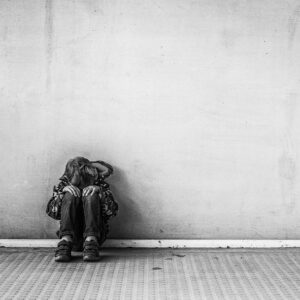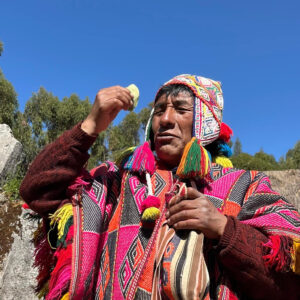Women often cope with intolerable situations and stress not with a sympathetic response such as fight, flight, or freeze, but with appeasement (or submission, fawning), a parasympathetic response of the dorsal vagus identified as another important trauma response along with shutdown since Dr. Stephen Porges’ findings on the polyvagal theory.
Appeasement springs from a very resilient nervous system that is not available to everyone. It represents a complicated and skillful neurobiological strategy that, through appropriate interaction, appeals to the offender’s relational system and aims to elicit compassion and trust. It is a desperate attempt to avoid abuse, injury, or even death through submission. Especially in inescapable environments where fighting only increases the threat and harm, appeasement seems to be the best survival strategy. It is an attempt to repair the attachment to the caregiver by prioritizing the caregiver’s needs over one’s own. Later in life, appeasers often try to find safety by constantly reading and adjusting to other people’s emotions. Appeasement can easily be confused with empathy, however, it is a fear-driven type of self-sabotage expressed through heightened vigilance and sensitivity to threat.
The most famous example of appeasement is Stockholm syndrome, which is described as a reaction to traumatic entrapment and paradoxically leads to a positive relationship with the oppressors that may persist beyond release. Perpetrators, however, are in most cases family members or close acquaintances with whom a relationship is often maintained into adulthood despite ongoing threats, whether out of shame, fear, or habit. Trauma can only be processed, however, if this contact is at least temporarily interrupted.
Appeasement is the mammalian defense response most relevant to life-threatening situations and traumatic entrapment, and appears to be the foundation of complex PTSD. Long-term appeasement in childhood leads to a number of typical behaviors and beliefs about the self: high sensitivity, empathy and vigilance, sense of responsibility, auto-aggression (such as negative self-talk or self-blame), shame and guilt, low self-esteem, insecurity, anxiety, “not being good enough,” feeling unseen or unimportant, depression, addictions and self-harm, chronic pain or illness, and unhealthy boundaries.
The lack of healthy boundaries is a widespread problem that women unfortunately still face almost everywhere in the world. The paternalistic structures we still have to live with today demand excessive flexibility and tolerance from women, be it in terms of their careers, their opportunities, their relationships or their role as mothers. All too often, women are still expected to conform to circumstances without argument, rather than saying no or even getting angry when our boundaries are crossed or ignored.
Often this dynamic begins in childhood, when girls are expected to be polite, quiet, helpful and reasonable, while boys are allowed to be louder and more aggressive because of their seemingly wilder nature. If we have developed a coping strategy based on appeasement regarding our caregivers in addition to the societal dictate, we are often unconsciously and deeply enmeshed in this response pattern. We try at all costs to please other people and to recognize their needs wordlessly in order to be accepted, liked or at least left alone. In doing so, we ignore our own needs and boundaries because we have never experienced healthy relationship dynamics. We often do not know what is right or wrong because we carry a distorted perception of these categories and blame ourselves for external situations. This leads to a variety of psychological and somatic problems, as well as internal and external disorientation and isolation.
Connection and orientation are two of the many healing effects of energy medicine. The cosmology of the Q’ero Nation of Peru, whose wisdom and medicine I studied in the Light Body School (Dr. Alberto Villoldo), is based on the ancient culture of the Incas, who, upon arrival of the conquistadors 500 years ago, retreated to the high Andes and guarded this wisdom. Today, the descendants of the Incas; the Q’ero carry this knowledge to the world. For example, they believe that we have never left paradise and that we (can) still live in harmony with nature. This is contrary to our Judeo-Christian understanding of Adam and Eve’s expulsion from the Garden of Eden and our original sin, the collective guilt for eating from the Tree of Knowledge. The Q’ero believe that we are One with the Earth and indeed her guardians and stewards, that we are connected through our luminous energy field to dimensions and entities beyond our limited perception of a materialistic/reductionist reality that seeks to understand everything through the mind. This mind represents only one and the least developed organ of perception and intelligence of our body. Far more wisdom lies in our hearts and guts, in our intuition and subtle remembrance of a way of life that was lost centuries ago.
How Energy Work Can Heal Appeasement
It may seem difficult to accept the concept of the luminous energy field or energy body that not only the Q’ero work with. When we turn to the fairly new scientific discipline of quantum physics, we find evidence of a universal truth that has been known and used for millennia by indigenous cultures around the world, and which we have programmatically been trained to forget about in our “civilized” world. Consider the European witch hunts resulting in mass extinction of herbalist and spiritual women, knowledgable in the healing arts and midwifery, in direct connection with life. The loss of this wisdom has systematically separated us from our roots and intuition. Since C.G. Jung published his profound research and theory on the collective unconscious and archetypes about 100 years ago, we are slowly beginning to remember and reconnect with our spirituality .
For women in particular to move beyond appeasement, a more feminine, maternal, loving and caring setting is needed than our scientific, sober approach. For generations, the toxic influence of our paternalistic structures has resulted in this self-destructive coping strategy being passed down from mothers to daughters. Energy medicine, with its cosmic as well as loving and compassionate understanding, opens a space where it is often easier to overcome this heavy, ancient legacy as we connect with our ancestors and get back in touch with our yin qualities and buried strengths and qualities. It works with our intuition, our soul, our connection and with the subtle flow of energies.
Energy work not only offers a higher level of cosmic order and connection, but can also serve as a compass for navigating our lives. By becoming independent of other people’s approval, we learn to find everything we need to feel safe and loved – within ourselves and beyond. In this way, hypnotherapy and energy medicine overlap and complement each other: both methods allow us to feel into our subconscious, our beliefs, and our bodies, bringing us into contact with ourselves. But while the Western approach addresses the heart, body and mind, Q’ero medicine enriches the healing work by nourishing our spirit, deepening our trust. Energy medicine offers us a map for a profound quest of the soul, reassuring us of the eternal omnipresent flowing energy.
Combining energy medicine with our Western approach also helps our conditioned minds to better accept and integrate energetic transformation. When we reflect cognitively and emotionally on what triggered our imprints or a soul loss, and how the core beliefs that arose from them affect our lives, an energy medicine cleansing of our light body can manifest much more sustainably in our lives. For this reason, I prepare each energy medicine intervention with a few sessions of therapeutic self-exploration, as I have found that a drop-in session with energy medicine without prior reflection tends to be misunderstood as a wellness treatment. In my humanistic understanding, all therapeutic work is an invitation to take an active and personal responsibility for our own healing and to apply the insights gained in the sessions to our daily lives.
Energy medicine is a deeply nurturing and connecting practice, primarily because of its transpersonal framework within a sacred space and the support of the invoked archetypes and energies. By actively participating in the healing process, by consciously letting go of what no longer serves us and drawing healthy boundaries, we step out of our passive victim role. At the same time, we are invited to receive care, attunement and love, accompanied by stimulation of all the senses through the use of flower waters, rattles, drums, bells, crystals and feathers. In this setting we more easily find the courage to give ourselves permission to express our needs, to show up in our pain and suffering without fear of being judged, belittled, pushed away or ignored. Through this authenticity, we are able to connect deeply with our inner truth and wisdom, and step out of the limiting beliefs of our life story, piece by piece.


